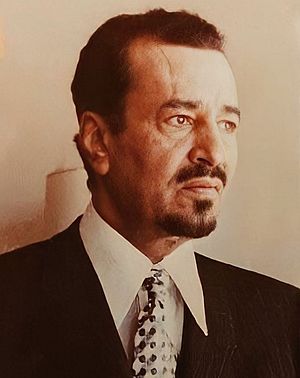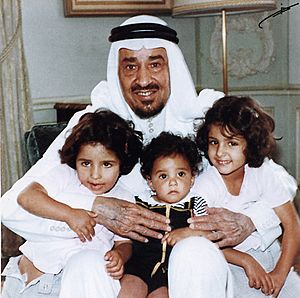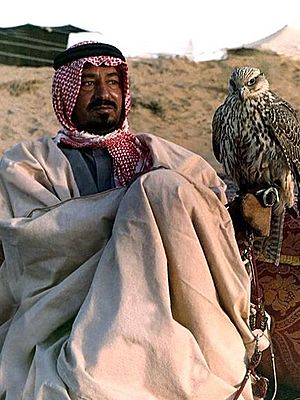Khalid of Saudi Arabia facts for kids
Quick facts for kids Khalid |
|||||
|---|---|---|---|---|---|
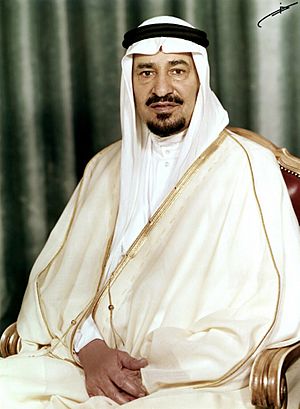
Official portrait, 1977
|
|||||
| King and Prime Minister of Saudi Arabia | |||||
| Reign | 25 March 1975 – 13 June 1982 |
||||
| Bay'ah | 25 March 1975 | ||||
| Predecessor | Faisal | ||||
| Successor | Fahd | ||||
| Deputy Prime Minister | |||||
| In office | 31 October 1962 – 25 March 1975 |
||||
| Monarch | Saud Faisal |
||||
| Regent | Crown Prince Faisal (1964) | ||||
| Prime Minister | Faisal bin Abdulaziz | ||||
| Born | 13 February 1913 Riyadh, Emirate of Riyadh |
||||
| Died | 13 June 1982 (aged 69) Ta’if, Saudi Arabia |
||||
| Burial | 13 June 1982 Al Oud cemetery, Riyadh |
||||
| Spouse |
List
Latifa bint Ahmed Al Sudairi
Tarfa bint Abdullah Al Saud Noura bint Turki Al Saud Seeta bint Fahd Al Damir |
||||
| Issue |
List
Prince Bandar
Prince Abdullah Princess Al Bandari Princess Al Jawhara Prince Fahd Princess Nouf Princess Moudi Princess Hussa Prince Mishaal Prince Faisal |
||||
|
|||||
| Dynasty | House of Saud | ||||
| Father | King Abdulaziz | ||||
| Mother | Al Jawhara bint Musaed Al Jiluwi | ||||
Khalid bin Abdulaziz Al Saud (born 13 February 1913 – died 13 June 1982) was a very important leader in Saudi Arabia. He served as the King and Prime Minister of Saudi Arabia from 1975 until his death in 1982. Before becoming king, he was the Crown Prince of Saudi Arabia for ten years.
Khalid was the fifth son of King Abdulaziz, who founded modern Saudi Arabia. He was one of six sons of Abdulaziz who became kings. Khalid helped his half-brother Prince Faisal with his duties as a foreign minister. He also served as a leader in the Hejaz region for a short time. In 1943, he visited the United States with Prince Faisal, helping to build good relations between the two countries.
When King Faisal was assassinated in 1975, Khalid became king. His time as king saw many big changes in Saudi Arabia. This was thanks to a large increase in money from oil. There were also important events in the Middle East during his rule. King Khalid passed away in 1982 and was followed by his half-brother Fahd.
Contents
Early Life and Education
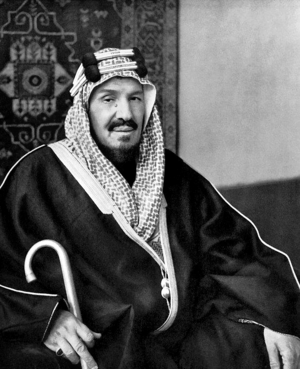
Khalid was born in Riyadh on 13 February 1913. He was the fifth son of King Abdulaziz. His mother, Al Jawhara bint Musaed, came from the important Al Jiluwi family. This family often married into the Al Saud royal family.
Khalid had one full brother, Muhammad. He went to the Mufirej school in Riyadh. There, he learned to read, write, and do basic math.
Early Experiences and Roles
When Khalid was 14, his father sent him to meet with desert tribes. His job was to listen to their concerns and help solve problems. In 1928, he and his brother Muhammad watched the border during a local uprising.
Prince Khalid also traveled with his brother Prince Faisal on trips to other countries. He learned a lot about how to lead a modern country. He was known for being open with the press about Saudi Arabia's foreign policy.
In 1932, Prince Khalid became the acting leader of Hejaz. He then became the official leader, replacing Prince Faisal. This role lasted until 1934. Prince Khalid also joined the Saudi army and fought against Yemeni forces in 1934. After the war, he led the Saudi team at a peace conference with Yemen. This led to a peace treaty that he signed for Saudi Arabia.
In 1934, Prince Khalid became the interior minister. He also represented Saudi Arabia in peace talks in Yemen in 1935. In 1939, he attended a conference in London about Palestine.
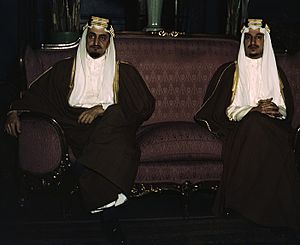
In October 1943, Prince Faisal and Prince Khalid visited the United States. They represented their father, King Abdulaziz. This visit was the first high-level meeting between Saudi Arabia and the USA. They met with President Franklin D. Roosevelt and Vice President Henry A. Wallace. A diplomat described Prince Khalid as the "nicest man in Saudi Arabia" after this visit.
In 1960, King Saud named Prince Khalid as acting prime minister. On 31 October 1962, he became deputy prime minister. This showed his growing importance in the line to the throne. Prince Khalid supported Crown Prince Faisal during a disagreement with King Saud.
Becoming Crown Prince
Khalid's older full-brother, Prince Muhammad, chose not to be in line for the throne. Khalid also turned down the offer to be Crown Prince many times. King Faisal convinced him that his role was important for peace within the royal family. Some believed he was chosen because he wasn't very interested in politics. This helped the royal family agree on a successor.
Khalid was officially named Crown Prince on 29 March 1965. He also became the first deputy prime minister. While he wasn't involved in every daily issue, he represented the King in meetings. He also managed affairs in the Mecca Province for King Faisal.
In 1970, Crown Prince Khalid led Saudi teams to Jordan. They helped Palestinians affected by attacks. In 1971, he had strong support from tribal leaders and religious authorities.
King Khalid's Reign
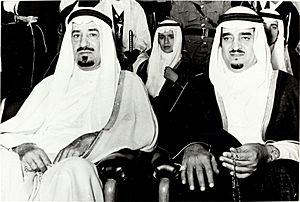
Khalid became king on 25 March 1975, after King Faisal was assassinated. He was declared king after a meeting of important members of the Al Saud family. Khalid also became the prime minister of Saudi Arabia. He led two important councils: the Higher Council for Administrative Reform and the Supreme Council for National Security.
Some people thought King Khalid was just a figurehead, meaning others made the decisions. However, he was actually the final decision-maker on all major policies. King Khalid worked to improve education, healthcare, and the country's infrastructure. He became more active in politics after his health improved.
King Khalid was seen as a kind and honest leader. He had good relationships with traditional leaders in Saudi Arabia. This helped him gain support from other princes and powerful groups. Many believe his reign was a "golden era" for the country.
Domestic Affairs and Development
King Khalid's reign brought huge development to Saudi Arabia. The country became one of the richest because oil revenues grew greatly. In 1977, oil money was $40 billion, and by 1980, it was $90 billion.
King Khalid focused on developing the country, especially agriculture. New industrial cities, Jubail and Yanbu, were built early in his reign. The Royal Commission for Jubail and Yanbu was created in 1975 to manage these cities. The Jeddah Port Authority was also set up to make the port bigger.
The number of schools increased a lot during his rule. In 1975, there were over 3,000 elementary schools. By 1980, this number grew to over 5,000. King Faisal University was also established. New colleges for women, including medicine and pharmacology, were opened in 1976.
Soon after becoming king, Khalid released political prisoners. These prisoners had been arrested during King Faisal's rule. He also allowed those who had been exiled to return to Saudi Arabia.
King Khalid continued to involve both royals and non-royals in important government jobs. He increased the role of non-royals in the government. Many of these non-royals had studied at foreign universities.
The country experienced a big economic boom. King Khalid launched the second Five-Year Plan in 1975. This plan aimed to build up Saudi infrastructure and healthcare. The budget for this plan was $142 billion. He also started the third development plan in 1980 with a budget of $250 billion.
King Khalid made changes to his government. He appointed Crown Prince Fahd as deputy prime minister. This made Fahd a very powerful figure. Prince Nayef became the minister of interior. Prince Saud became the foreign affairs minister.
Six new ministries were created by King Khalid. These included the ministry of municipal and rural affairs and the ministry of public works and housing. These appointments helped balance power within the cabinet. Other new ministries included industry and electricity, higher education, and planning.
King Khalid's main advisors included his brother Prince Mohammad. They worked together on most political issues.
In November 1979, two major events happened in Saudi Arabia: the Grand Mosque seizure and the Qatif Uprising.
Grand Mosque Seizure
On 20 November 1979, a group of people took over the Grand Mosque in Mecca. This group was against the government. They also tried to kidnap King Khalid in Taif, but he changed his plans and escaped.
When news of the attack reached Riyadh, King Khalid asked religious scholars for permission to use military force. After some time, they agreed. Crown Prince Fahd and Prince Abdullah were out of the country. So, King Khalid put Prince Sultan and Prince Nayef in charge of handling the situation.
Saudi forces regained control of the Grand Mosque on 4 December 1979. Later, 63 rebels were executed. Even though the rebels were punished, the religious leaders who inspired them gained more power. They successfully pushed King Khalid to adopt stricter religious policies.
Qatif Uprising of 1979
In November 1979, Shiite Muslims in the Eastern Province protested. They were unhappy with living conditions in their villages. King Khalid had announced a large budget to improve life for all citizens. However, many felt the royal family benefited more.
After some protestors were released, King Khalid and Crown Prince Fahd visited the Eastern region. King Khalid changed his policies towards the Shiite population. This led to them changing their views and supporting the government.
International Relations and Diplomacy
King Khalid was not as interested in foreign affairs as King Faisal. However, his reign saw many important global events. These included the Iranian Revolution and the Soviet invasion of Afghanistan. These events had a big impact on Saudi Arabia. His government also worked to improve relations with neighboring countries. They were also more moderate regarding the Arab–Israeli conflict. Kamal Adham was King Khalid's main advisor on foreign policy.
King Khalid also started bringing in foreign workers to help with the country's development.
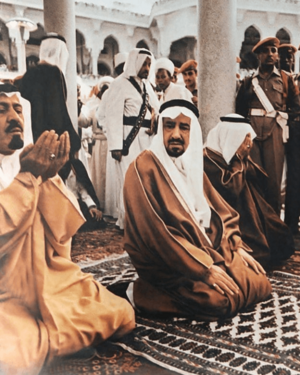
Diplomatic Efforts (1975–1980)
In April 1975, King Khalid helped settle a border dispute over the Al Buraymi Oasis. This area was claimed by Abu Dhabi, Oman, and Saudi Arabia. Solving this long-standing issue increased his standing as a statesman.
His first official visit as king was to Cairo, Egypt, in July 1975. This showed Saudi Arabia's support for peace efforts between Arabs and Israel. In December 1975, King Khalid visited Damascus. He met with Syrian President Hafez Assad to discuss supporting Muslims in Lebanon, where a civil war had begun.
Diplomatic relations with the People's Democratic Republic of Yemen were restarted in March 1976. In April 1976, King Khalid visited all the Gulf states. He hoped to build closer ties with his neighbors. He also called for many summits and helped create the Gulf Cooperation Council (GCC) in 1981.
King Khalid helped create the Safari Club in 1976. This was a secret group of countries (Egypt, France, Iran, Morocco, and Saudi Arabia). Their goal was to prevent the spread of communism in the region. King Khalid also organized a conference in Riyadh in October 1976. This conference helped end the civil war in Lebanon. He also visited Pakistan and started the building of the Faisal Mosque in Islamabad.
In May 1977, King Khalid met with Hafez Assad and Anwar Sadat. They discussed a plan for the Arab–Israeli conflict. In October 1978, King Khalid met with U.S. President Jimmy Carter. The Camp David Accords in September 1978 affected Saudi Arabia's alliance with Egypt. Saudi Arabia ended diplomatic relations with Egypt after this.
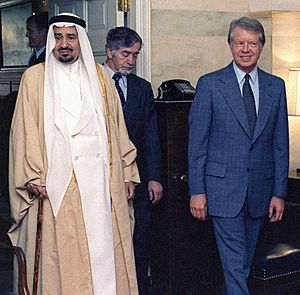
After the 1979 Islamic Revolution in Iran, King Khalid sent a message to Ayatollah Khomeini. He said that Islamic unity could lead to closer ties between the two countries. However, his efforts were not successful. Saudi Arabia later supported Iraq against Iran in the Iran–Iraq War in 1980.
Later Years (1980–1982)
In April 1980, King Khalid canceled a visit to Britain. This was a protest against a TV show called Death of a Princess. The show was about the execution of a Saudi princess. The British ambassador was also sent away from Saudi Arabia for five months.
In March 1981, King Khalid helped Pakistan end the hijacking of a plane. He also met with British Prime Minister Margaret Thatcher in Saudi Arabia. King Khalid visited the United Kingdom in June 1981 and Spain in June 1981.
King Khalid asked U.S. President Jimmy Carter to sell advanced fighter planes to Saudi Arabia. These planes would help fight against communism in the area. The first of these planes arrived in 1982.
King Khalid's Views
King Khalid believed that Islamic law should always be the guide for Saudi Arabia. He also said, "We are against communism and we will protect ourselves against it by all means." He thought that if the United States helped create peace between Arabs and Israel, Russia would not gain influence in the Middle East.
He also said that Zionism, communism, and colonialism were working together against Arab and Islamic rights. He believed Saudi Arabia's policy was based on this understanding.
At a meeting in January 1981, he said that Saudi Arabia should not side with either the USA or the Soviet Union. He believed that the security of Islamic nations would not come from joining military alliances.
Personal Life and Hobbies
King Khalid was married four times and had ten children. His wives included Noura bint Turki Al Saud and Seeta bint Fahd Al Damir. Noura was the mother of his older sons, Prince Bandar and Prince Abdullah. Seeta had seven children with King Khalid.
His eldest son, Prince Bandar, was born in 1935. Prince Faisal, his youngest child, is a former governor and a member of the Allegiance Council. His daughter, Moudi, is involved in important foundations like the King Khalid Foundation.
Personality and Pastimes
King Khalid was described as warm, cheerful, and caring. He was loved by his brothers and sisters. An American journalist noted that King Khalid listened carefully to his people. He often showed his sense of humor. People saw him as an open and good man. His favorite topics to discuss were education and youth.
King Khalid was good at solving problems, a skill his father recognized early on. He acted as a mediator between different groups within the royal family.
Falconry (hunting with falcons) and horse-riding were King Khalid's favorite hobbies. He was known as a "man of the desert." He had one of the best collections of falcons. In the late 1970s, he received a rare gyrfalcon as a gift from the Canadian government. Hunting was also a favorite activity. He bought the first Toyota Landcruiser in 1955 for falconry. In 1975, he bought a very long Cadillac for falconry, which was nicknamed "Khalidillac."
He lived in Riyadh but spent summers in Taif. He also owned a desert farm outside Riyadh. In 1977, he bought a house in London for £1.9 million. He used it after having hip operations in a London hospital.
Health Concerns
King Khalid had heart problems for a long time. He had a major heart attack in 1970 and heart surgery in 1972 in the United States. Because of his health, Crown Prince Fahd often took charge of ruling the country. He had a second heart surgery in 1978 and a hip operation in 1976. In February 1980, he had another minor heart attack.
Death and Funeral
King Khalid died on 13 June 1982 from a heart attack. He passed away at his summer palace in Taif. His body was taken from Taif to Mecca on the same day. After funeral prayers at the Grand Mosque in Mecca, King Khalid was buried in Al Oud cemetery in Riyadh. Leaders from many countries attended his funeral.
Legacy and Recognition
Many places and institutions are named after King Khalid. These include King Khalid International Airport in Riyadh, King Khalid University, and King Khalid Eye Specialist Hospital. The King Khalid Military City and King Khalid Medical City are also named in his honor. There is a mosque in Riyadh and a bridge in Jeddah named after him. A research center for wildlife in Saudi Arabia is also named the Khalid Wildlife Research Centre.
His family also started the King Khalid Foundation. This foundation gives awards to people who achieve great things in social responsibility and innovation.
Awards and Honors
In January 1981, the United Nations (UN) gave King Khalid a gold medal. This is the UN's highest award for leaders who contribute to peace and cooperation worldwide. King Khalid also received the King Faisal International Prize for Service to Islam in 1981. This was for his efforts to support Islamic unity.
Honours
| Styles of King Khalid |
|
|---|---|
 |
|
| Reference style | His Majesty |
| Spoken style | Your Majesty |
Foreign Honours
 Honorary Recipient of the Order of the Crown of the Realm (Malaysia, January 1982)
Honorary Recipient of the Order of the Crown of the Realm (Malaysia, January 1982) Grand Cross of the Order of Civil Merit (Spain, 15 February 1974)
Grand Cross of the Order of Civil Merit (Spain, 15 February 1974) Collar of the Order of Charles III (Spain, 15 June 1981)
Collar of the Order of Charles III (Spain, 15 June 1981) Knight of the Royal Order of the Seraphim (Sweden, 20 January 1981)
Knight of the Royal Order of the Seraphim (Sweden, 20 January 1981)
Images for kids
See also
 In Spanish: Jálid bin Abdulaziz para niños
In Spanish: Jálid bin Abdulaziz para niños
 | Anna J. Cooper |
 | Mary McLeod Bethune |
 | Lillie Mae Bradford |


